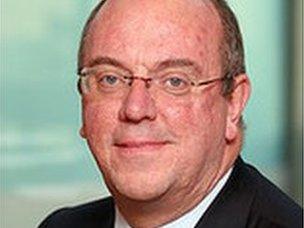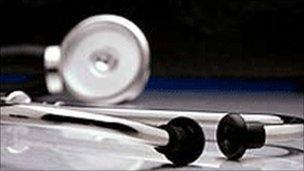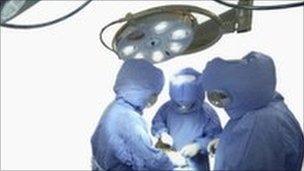Why the NHS must face up to the new world
- Published

Sir David believes the hospitals will have to adapt
In a career spanning more than 30 years in the health service, Sir David Nicholson has risen from management trainee to the top job, chief executive.
He will continue to play a prominent role under the forthcoming reforms after being appointed head of the NHS commissioning board in England.
The board will oversee the network of GP consortia that will take charge of running local health services from 2013.
He will take up the post from next April, as the board starts operating in shadow form.
With the health service gearing up for what has been dubbed the biggest re-organisation in its history, he says the changes will present a huge challenge to hospitals in particular, and called on them to be ready to adapt to the changing landscape.
He also said he wanted to see doctors leading the case for reform, saying without getting them on board the NHS faces a fight to convince the public on the need for change.
Holding GPs to account
Many people have been taken aback by the amount of power being given to GPs. Once the consortia are set up, family doctors will hold the purse strings for about 80% of the NHS budget.

The government wants GPs to take on more responsibility
And with strategic health authorities being scrapped as part of the shake-up, regional oversight will disappear.
But Sir David was insistent the commissioning board would be able to keep an eye on how doctors are doing.
He said the consortia will have a variety of performance data covering the quality of care being provided to the financial state of the organisations through which they will be able to hold them to account.
He said there would also be powers to intervene where necessary.
"At the end of the day if a consortium is unable to manage itself the commissioning board has the right to step in and either reallocate the population to another consortium or put in alternative management arrangements to make it work."
But he added: "We would hope it would be rare. Acting early and giving support... is always better."
The challenge facing hospitals
Sir David's message for hospitals is clear - be prepared for change.
"Most hospitals will be able to survive and thrive in the new world. But undoubtedly there will be those that will find it difficult."
He suggested hospital bosses should look to learn from those who are already altering the way they work.
Some have started running clinics for people with conditions such as diabetes and asthma in the community - and Sir David believes this will be essential as GP consortia will be looking to move more and more care out of secondary care.
But he also warned that some trusts - particularly the smaller ones - may have to consider changing their structures.
He said mergers were one option, although he pointed out they were not always successful.
"We have to be fairly circumspect about it. But there will be times when we do it."
Another option would be for a private firm to take over the management of a trust. This is happening in one place already - Hinchingbrooke Hospital in Cambridgeshire.
But he added he would expect the numbers making such radical changes would be small. He also suggested it was highly unlikely any hospitals would have to completely close as unions and managers have claimed in recent months.
Whatever happens, however, he is certain about one thing - doctors have to lead the way.
"If the clinicians are backing that change you are more likely to take your population with you."
The toughest budget yet
With all the spending cuts being made across other departments, it often goes overlooked that the NHS is still having to deal with one of its toughest settlements.

The NHS budget is more than £100bn a year in England
In fact, Sir David said it was "significantly more modest" than any since the NHS was created in 1948.
Over the next four years, the budget will rise by just 0.1% above inflation.
But Sir David pointed out that the NHS has always tended to do well in budget settlements with an average rise of 4.5% a year over the past six decades.
"The settlement was generous when you look across the rest of the public service. [But] there has never been a time where we have had four years of flat real growth. It is unprecedented."
However, he said the challenge should not mean a fall in patient satisfaction.
"My ambition is to keep the performance of the NHS, at an absolute minimum, the same as it is now and wherever possible improve it."
Revolution or evolution?
Many have claimed the changes being made represent the biggest shake-up of the health service ever. But Sir David is not so sure.
Instead, he believes they build on what has been happening for the past 20 years.
"The first thing I would say is it's big. I would not underestimate the scale of the changes.
"But of course a lot of the changes that we are moving forward to now we have been working forward and thinking about for many years.
"For 20 years now we have been working with GPs about how to get them involved with commissioning and shaping services."
He pointed out this started with the Tory government of the early 1990s and continued under Labour through to a system called practice-based commissioning which allowed doctors working in partnership to get virtual budgets.
He also said greater autonomy has also been given to hospitals over the years, meaning the push for all trusts to achieve foundation status was part of a natural move.
But he accepted the latest plans did represent an "acceleration" of that process.
- Published25 February 2011
- Published1 March 2013
- Published16 January 2011
- Published25 November 2010